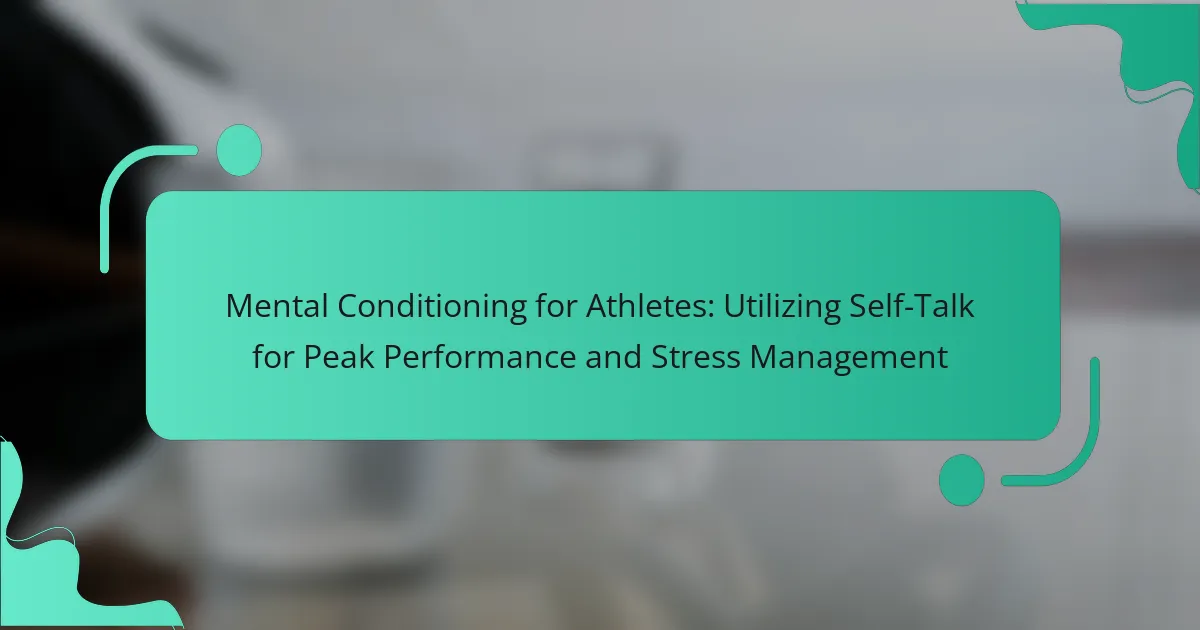Mental conditioning for athletes is crucial for enhancing performance and managing stress. Self-talk techniques improve focus, boost confidence, and help athletes navigate competitive pressures. Research indicates that effective self-talk can lead to a 10-20% increase in performance. By incorporating strategies like positive affirmations and visualization, athletes can build resilience and optimize their mental preparation.

What is Mental Conditioning for Athletes?
Mental conditioning for athletes involves techniques like self-talk to enhance performance and manage stress. This practice enables athletes to develop a positive mindset, improve focus, and build resilience. Research shows that effective self-talk can lead to a 10-20% increase in performance levels. By using specific phrases and affirmations, athletes can combat negative thoughts and reinforce confidence. This approach not only aids in mental preparation but also helps in coping with competitive pressure, making it a unique and essential aspect of athletic training.
How does self-talk influence athletic performance?
Self-talk significantly enhances athletic performance by improving focus, motivation, and confidence. Positive self-talk can reduce anxiety and stress, leading to better outcomes during competitions. Research indicates that athletes using constructive self-talk experience increased resilience and improved performance metrics. This mental conditioning technique fosters a growth mindset, enabling athletes to overcome challenges effectively.
What are the key components of mental conditioning?
Mental conditioning for athletes includes self-talk, visualization, goal-setting, and relaxation techniques. These components enhance performance and manage stress effectively. Self-talk involves positive affirmations that boost confidence. Visualization helps athletes mentally rehearse their performance. Goal-setting provides clear objectives, while relaxation techniques reduce anxiety and improve focus. Each component plays a vital role in achieving peak performance.

What are the universal benefits of self-talk in sports?
Self-talk in sports enhances focus, boosts confidence, and aids in stress management. Athletes can harness positive self-talk to improve performance by reinforcing their mental resilience. Research indicates that effective self-talk strategies can lead to a 10-20% increase in performance metrics. Furthermore, unique attributes of self-talk, like personalization, allow athletes to tailor their mental cues to specific situations, enhancing their effectiveness. As a result, athletes utilizing self-talk can navigate competitive pressures more effectively, leading to better outcomes in high-stress environments.
How does positive self-talk enhance confidence?
Positive self-talk significantly enhances confidence by reinforcing a positive self-image and reducing anxiety. It helps athletes focus on their strengths and capabilities, leading to improved performance. Research shows that athletes who engage in constructive self-talk experience less stress and better manage competition pressure. This mental conditioning technique not only boosts confidence but also fosters resilience, allowing athletes to overcome setbacks effectively.
What role does self-talk play in stress management?
Self-talk plays a crucial role in stress management by helping athletes regulate their emotions and maintain focus. Positive self-talk can enhance confidence, reduce anxiety, and improve performance under pressure. Techniques such as affirmations and motivational phrases can shift mindset and foster resilience during challenging situations. Research indicates that athletes who engage in constructive self-talk experience lower stress levels and better coping strategies. This mental conditioning technique is essential for achieving peak performance in competitive environments.
How can self-talk improve focus during competitions?
Self-talk can significantly enhance focus during competitions by promoting a positive mindset and reducing anxiety. Athletes who engage in constructive self-talk often report improved concentration and performance. This technique allows them to redirect their thoughts, reinforcing confidence and clarity. Research indicates that self-talk can lead to better stress management, enabling athletes to maintain focus under pressure. By utilizing specific phrases or affirmations, competitors can create a mental environment conducive to peak performance.

What unique strategies can athletes use for effective self-talk?
Athletes can use several unique strategies for effective self-talk, enhancing performance and managing stress. Techniques include positive affirmations, visualization, and reframing negative thoughts.
Positive affirmations involve repeating encouraging phrases, boosting self-confidence. Visualization entails mentally rehearsing successful performances, creating a strong mental image of achievement. Reframing negative thoughts shifts focus from failure to growth opportunities, fostering resilience.
Incorporating these strategies can lead to improved focus, reduced anxiety, and enhanced motivation, ultimately contributing to peak athletic performance.
How can athletes tailor self-talk to their specific sports?
Athletes can tailor self-talk by aligning their internal dialogue with the specific demands of their sport. For example, a sprinter might focus on speed and explosiveness, using affirmations like “I am fast” or “I can push harder.” In contrast, a golfer may emphasize calmness and precision, using phrases like “Stay steady” or “Focus on the target.”
Customizing self-talk to reflect unique attributes of each sport enhances mental conditioning. This approach can improve focus, reduce anxiety, and promote a positive mindset during competition. As a result, athletes can achieve peak performance and better manage stress.
What are some examples of effective self-talk phrases?
Effective self-talk phrases for athletes include “I am strong,” “I can handle this pressure,” and “Every step brings me closer to my goal.” These phrases enhance mental conditioning, fostering confidence and focus. Additionally, using affirmations like “I trust my training” and “I thrive under pressure” can improve performance and stress management. Tailoring self-talk to individual needs creates a unique mental toolkit that supports peak performance.

What are the rare challenges associated with self-talk?
Rare challenges associated with self-talk include negative spirals, misinterpretation of feedback, and over-reliance on verbal cues. Negative spirals occur when athletes focus on failures, undermining confidence. Misinterpretation of feedback can lead to confusion, impacting performance. Over-reliance on verbal cues may hinder athletes from utilizing non-verbal strategies effectively. These challenges can limit the effectiveness of self-talk in mental conditioning.
How can negative self-talk impact an athlete’s mindset?
Negative self-talk can significantly hinder an athlete’s mindset, leading to decreased performance and increased stress. It fosters self-doubt and anxiety, undermining confidence. This mental barrier can prevent athletes from reaching their peak potential during competitions. Research indicates that positive self-talk enhances focus and resilience, while negative self-talk can exacerbate pressure and lead to underperformance. Athletes must recognize and reframe negative thoughts to maintain a constructive mindset, ultimately improving their overall performance and mental well-being.
What are the signs of ineffective self-talk strategies?
Ineffective self-talk strategies often manifest through negative thoughts, lack of focus, and self-doubt. Signs include frequent self-criticism, persistent anxiety during performance, and an inability to maintain a positive mindset. These patterns hinder mental conditioning and peak performance for athletes. Recognizing these signs is crucial for implementing more effective self-talk techniques.

How can athletes implement self-talk techniques in training?
Athletes can implement self-talk techniques in training by integrating positive affirmations and focused phrases into their routines. This practice enhances motivation and reduces anxiety during performance.
To effectively utilize self-talk, athletes should follow these steps:
1. Identify specific goals and challenges.
2. Create personalized affirmations that resonate with their objectives.
3. Practice these affirmations consistently during training sessions.
4. Reflect on performance outcomes and adjust self-talk strategies as needed.
Research indicates that athletes who employ self-talk report improved focus and confidence, which are crucial for peak performance.
What steps should athletes take to develop a self-talk routine?
Athletes should follow specific steps to develop an effective self-talk routine. First, identify negative self-talk patterns. Next, replace these with positive affirmations that reinforce confidence. Then, practice these affirmations regularly, especially before competitions. Additionally, visualize success while using self-talk to enhance motivation. Finally, evaluate and adjust the routine as needed to ensure it remains effective.
How can coaches support athletes in using self-talk?
Coaches can support athletes in using self-talk by teaching them techniques to replace negative thoughts with positive affirmations. This approach enhances mental conditioning, leading to improved performance and stress management. Coaches should encourage athletes to practice self-talk during training and competitions, helping them build resilience and focus. Regular feedback and role-playing scenarios can also reinforce effective self-talk strategies, ensuring athletes feel confident and motivated.

What are the best practices for optimizing self-talk?
To optimize self-talk, athletes should focus on using positive affirmations, setting clear goals, and practicing mindfulness. These practices enhance mental conditioning, improve performance, and manage stress effectively. Regularly incorporating self-talk into training routines can lead to better focus and resilience during competitions.
What common mistakes should athletes avoid in self-talk?
Athletes should avoid negative self-talk, overgeneralization, and unrealistic expectations. These mistakes can undermine confidence and performance.
Negative self-talk often leads to a defeatist mindset. For example, phrases like “I can’t do this” can create self-doubt. Overgeneralization occurs when athletes make broad conclusions from single events, such as thinking “I always fail” after one mistake. Unrealistic expectations can create unnecessary pressure, leading to stress and anxiety.
Focusing on positive affirmations, realistic goal-setting, and constructive feedback can enhance mental conditioning and performance.
How can athletes measure the effectiveness of their self-talk?
Athletes can measure the effectiveness of their self-talk by tracking performance improvements and emotional responses. Key metrics include changes in focus, motivation levels, and stress management. Regular self-assessment through journaling or feedback can provide insights into the impact of self-talk on training and competition outcomes.
What expert insights can enhance self-talk practices?
Expert insights can enhance self-talk practices by integrating visualization techniques, affirmations, and mindfulness strategies. Visualization helps athletes mentally rehearse performance scenarios, fostering confidence. Affirmations reinforce positive beliefs, countering negative self-talk. Mindfulness cultivates awareness of thoughts, enabling athletes to redirect unproductive dialogues. These methods collectively improve focus and resilience, essential for peak performance and stress management.
